- Home
- Things to avoid in Germany
Things to Avoid in Germany – Do's and Don'ts
By: Lydia Fulson / Writer, Pyrography Artist, Thrill Seeker, and Traveler
“Oh, the places you'll go! There is fun to be done!” ~ Dr. Suess
Guten Tag, those who wanderlust!
Whether one has been traveling for years or is just starting on the path of adventure, the biggest travel tip that can be given is to do research. There's more to visiting a country than packing a suitcase, grabbing your passport, and hitting the road.
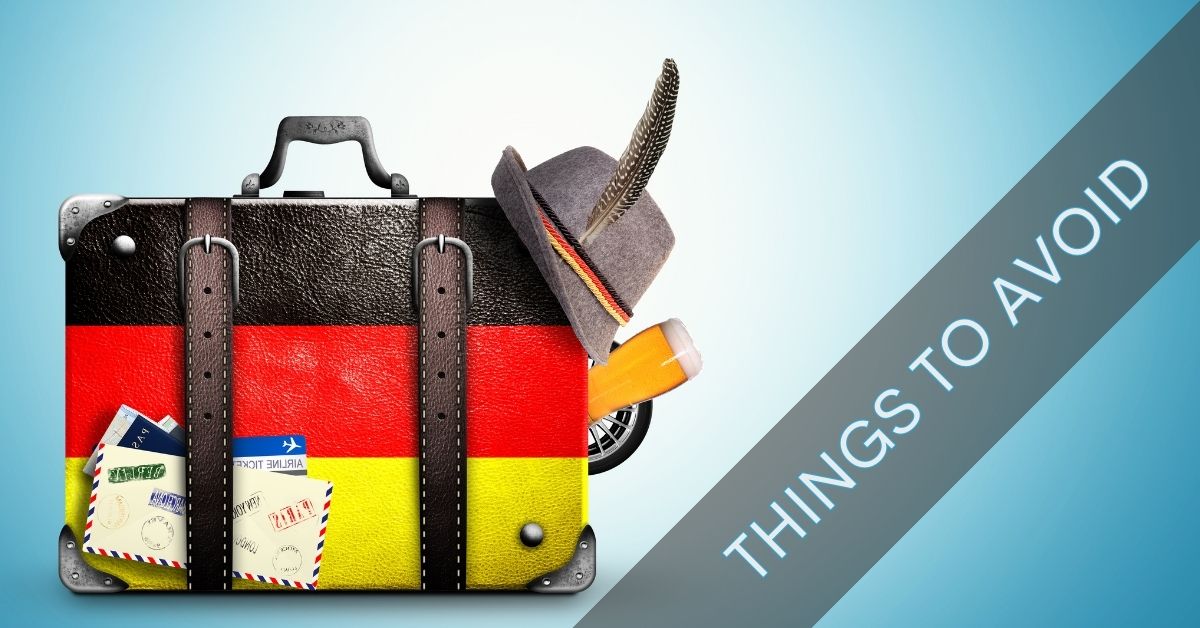
Every place in the world has its customs, unique rules, and things that you ... don't do. But some may see these rules and think, 'Well, that's normal where I'm from', but respecting and understanding these odd rules can help you so much during travels. Like anywhere else, there are things to avoid in Germany.
Sometimes it's best to avoid being seen as a tourist, and nothing screams tourist like not following necessary customs! The last thing one wants on a relaxing trip is to have people staring at and judging you for something that may seem completely normal to you.
Germany is the home to rich history, as well as fairytale castles, stunning half-timbered houses, romantic boat rides, festivals, and some of the most lecker cuisine out there!
Picture this … you've been on a romantic cruise on the river Rhine, visited the famous Neuschwanstein Castle, or stood small by the towering Brandenburg Gate and are a little thirsty. So, you venture to an Imbiss-Stand (street snack stand) or kiosks and pick up a bottle of water. Here's where our first Germany travel tip comes in.
On this page:
Things to Avoid in Germany
Avoid Recycling The Wrong Way
What you do with that empty bottle is vital for the environment and will help you not look like a tourist! Scattered about, one can find bins sectioned, usually in different colors, with sections for organic waste, plastic bottles, paper, and cans.
But what about the glass bottle? In Germany, there are particular containers for glass recycling, with clear glass collected separately from colored glass. These can be found in just about every neighborhood.
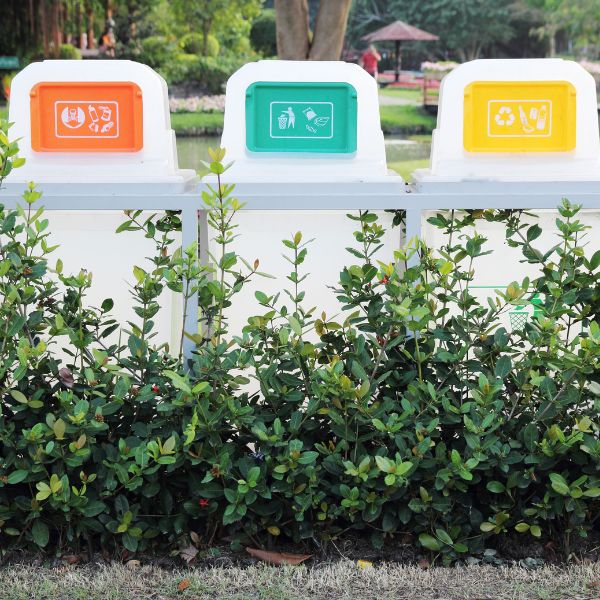 The bold colors really say "Hey! Pick that back up and put it in here"
The bold colors really say "Hey! Pick that back up and put it in here"Fun fact
Every supermarket has to accept empties if they are brought in. They can even be a different store from which the drink was bought.
Before you seek out one of these bins, check your receipt. You may notice a tiny fee (Pfand) added on after purchasing the glass or plastic water bottle. This is an average few cents shops add to the bill to encourage people to return the bottles back to the shop for reuse and proper disposal. It also helps manage the opportunity of littering.
Confusing? A bit at the start, but overall, better for the ecosystem. It's wunderbar to see a culture so strictly organized about something so important. After all, we want to keep our beautiful planet as healthy as possible to keep traveling and learning new nifty customs!
Speaking of nifty customs, here's one you may not have heard of.
Don't Disturb Quiet Hours Rule
Quiet hours are an important rule to respect when travelers visit Germany. It's unusual to hear of quiet hours if one is coming from a bustling, busy city life. But these hours are a great excuse to, well … do nothing!
Time to relax after a busy week. Quiet hours are typically from 10 pm-7 am on weekdays. Then on Sundays, they last all day.
Sundays are the days of rest. Only some places in Germany have the same rules regarding the times and what's allowed. In most big cities, this means no power tools, loud music, loud vacuums, leaf blowers, chainsaws, and just about anything that can disturb the silent peace.
Take the time to kick back and read a book, play some games, or binge that show you've been dying to watch!
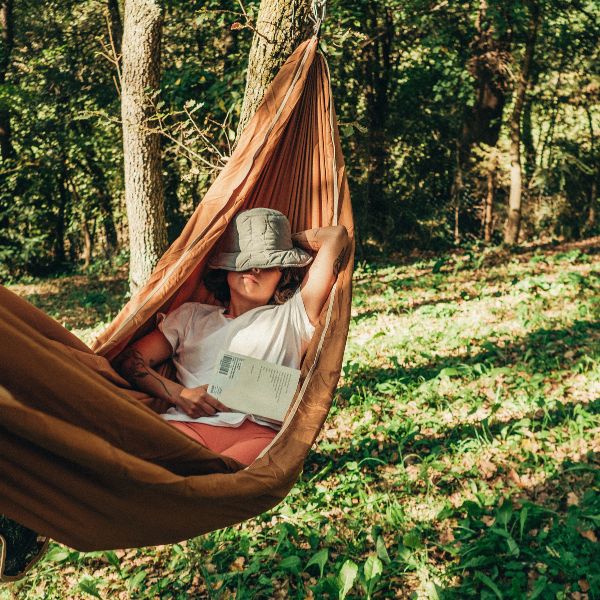 Just hanging out during quiet hours.
Just hanging out during quiet hours.It's important to know as a traveler that numerous shops are closed on Sundays. If searching for a place to eat, there's a big possibility that small shops in smaller towns won't be open on Sundays.
Cafés, bakeries, grocery stores, gas station stores, and a few more options tend to be open in larger cities like Berlin, as they are such busy tourist destinations. But if you do find open shops, hours will be shortened, and do still try to be respectful when out.
Keep the loud conversations to a minimum … or there may be some judgy stares and confrontations, which no one wants while on vacation!
Don't Forget The Cash
Like many countries in Europe, Germany loves cash. They often prefer using cash instead of debit or credit cards. Of course, machines will still be available in most shops, but sometimes they will only take debit or cash as forms of payment. It's always a good idea to travel with all three, just in case.
Everywhere is different, after all, which is a repeating remark for many of the German customs. Every city, town, and shop will be different, so it's best to be fully prepared with more than one way to pay.
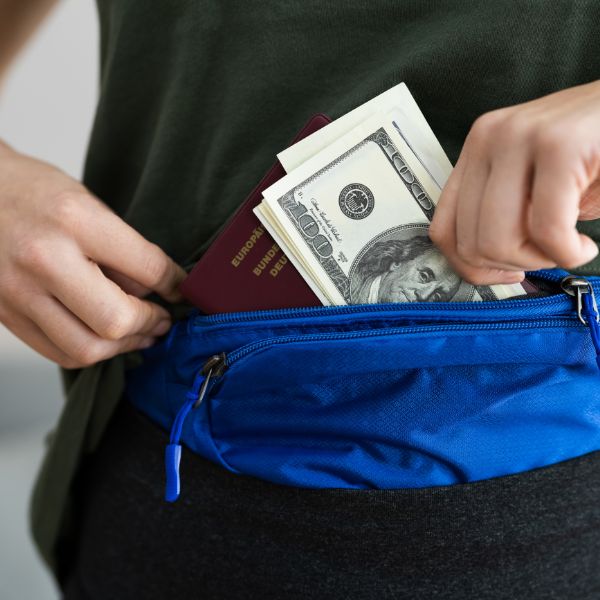 You can never be too careful!
You can never be too careful!Travel tip
Carrying cash safely in Europe is crucial, especially in places like France and Germany, where pickpocketing is not unheard of.
Keep that cash safe. Using things like money belts and anti-theft fanny packs is a great place to keep your cash close and on your person, rather than an easy-to-access hanging purse or in a pocket. Having both a money belt and a fanny pack is also a good idea. That way, one can keep some cash in the belt, under a jacket, and some in the fanny pack.
One can never be too careful when carrying so much money on a trip. Also, consider not carrying all of it with you every day. Hotels offer safes in the rooms that require passwords only you would know-so keep some behind to be triple safe!
Keep Bike Lanes For The Bikes!
Continuing our “things to avoid in Germany” list, let's avoid getting bumped by passing bikes.
Do not, absolutely not, walk or stand in a cycle lane! Stick to the streets and sidewalks but keep that lane clear for cyclists. Cycle lanes are a safe and efficient way for locals and travelers alike to get from points A to B safe and sound. Let's keep them working as safely and efficiently as they should by respecting the bikers' boundaries.
Bike lanes are easy to identify on the roads, as they are usually painted bold and bright to alert others. Plus, who really wants to get knocked over by someone on a bike while on vacation…?
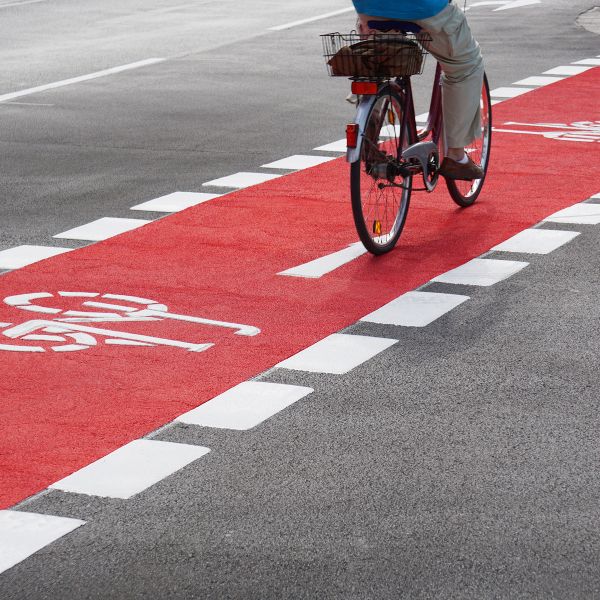 A great way to tour the cities of Germany.
A great way to tour the cities of Germany.Renting bikes is a great way to get a fun experience of Germany from a different perspective. Some of the best places and popular tourist spots, like the castles, have beautiful biking paths on their grounds. Public transportation is also available, but cycling is so much fun!
Try a tandem bike for a good laugh and a more effortless cruise.
Don't Overpack
Overpacking for day trips can become more of a hassle than a convenience.
Security inside the castle tours can sometimes be strict, depending on the location. This rule, as an example, is important when visiting Museum Island in Berlin. So if that stop is on your bucket list, pack lightly!
Museum Island is a major tourist attraction (and UNESCO World Heritage Site), displaying a handful of world-renowned museums with a rich history and many fun things to explore. But before starting your walking tour, you will likely be asked to leave your belongings in a secure coatroom. Sometimes bags are not allowed, and only phones, wallets, and medical items can be kept on your person.
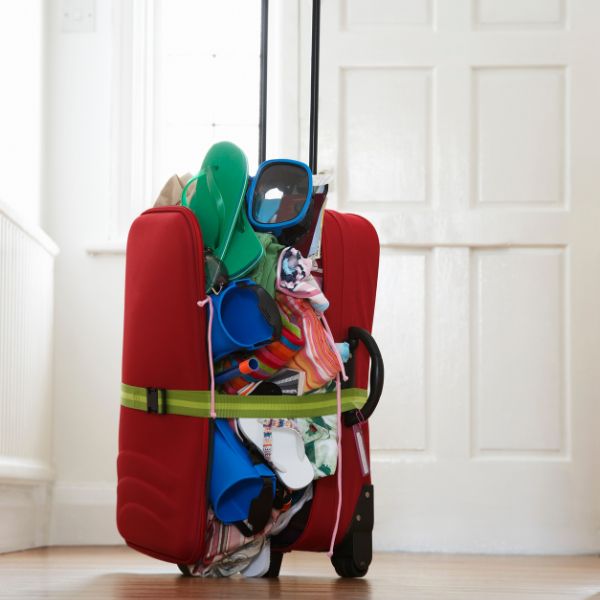 No one wants to have to do the whole 'sit on the suitcase to get it to close thing'!
No one wants to have to do the whole 'sit on the suitcase to get it to close thing'!If you're known for being a heavy packer, this can be frustrating, but please understand it's all just to ensure everyone is safe and has a good day! These museums are stunning pieces of history and important landmarks in Germany, and they deserve all the respect we can give.
Keep Your Shoes On? Not in Germany!
In Germany, waltzing into someone’s home with your shoes on is a fast track to raised eyebrows. Clean floors are defended with quiet intensity, and outdoor shoes are the enemy. The moment you step inside, off go the street shoes. Bare feet or socks? Also a bit meh. So, now what?

What you really need is a good pair of Hausschuhe (house slippers). I know I say not to overpack but, these are the best exception that are worth the tiny extra weight in your baggage. You'll never want to leave home without them!
Many locals bring their own. Yes, people actually travel with slippers ... myself included. I always pack a thin pair that easily slides into the pocket of my suitcase for those hotel nights.
But don’t panic if you didn’t pack any, or forgot your go-to comfy pair at home. Many German households keep a trusty slipper basket by the door, stocked with all shapes and sizes for guests. So, slip into something more comfortable and enjoy the warmest kind of German welcome, cozy toes included.
Jay Walking Is a No-No!
Red light, green light, no traffic, or the classic old saying, “I was in a rush!” No expression will be your saving grace when you get caught jaywalking in Germany.
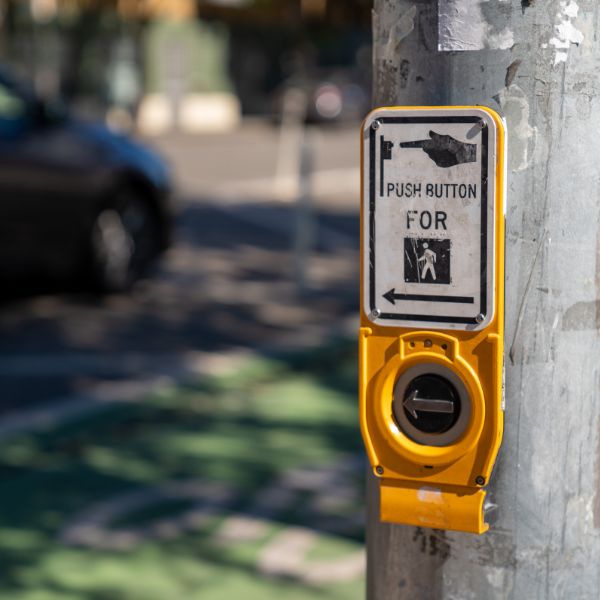 Jaywalking is a big ol' no!
Jaywalking is a big ol' no!In German culture, street rules are strict to keep everybody safe. Though one can get away with it in North American countries, and making a mad dash when the traffic is clear seems like a good idea, it's dangerous!
So while traveling to Germany, think twice before taking that dash because you will have a hard time talking your way out of paying that ticket at the town hall from the German authorities! Be safe and smart, always.
Don't Worry About A Language Barrier
Really! You don't have to study the entire German language to have a conversation with others. Of course, German people commonly speak German, but most are taught English, and if they hear a bit of struggle behind you trying to speak their language, they will switch to English.
Cashiers will typically be able to speak it in shops and restaurants, and many menus will also have English translations. If ever you're struggling in public places, don't be scared to ask for help. There will most likely be a German person who speaks English nearby.
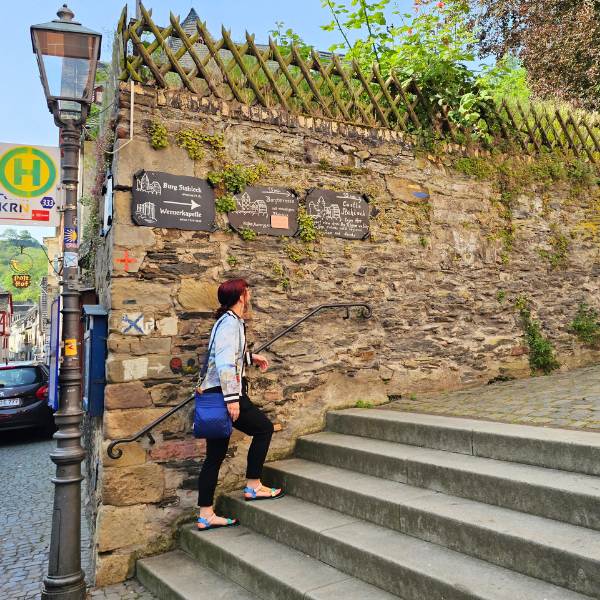 I might look like I knew what these signs said, but I really only knew two or three words... Guilty! Sometimes that's all you need!
I might look like I knew what these signs said, but I really only knew two or three words... Guilty! Sometimes that's all you need!Yes, it's great that they can help, but don't go to Germany without knowing any of the language. It may come in handy to know the basics like greetings, common phrases, some foods, and city names. Again, no one needs to learn the whole entirety of the language, but every little bit helps. After the first trip, it will get easier; then, you'll be all set for your next trip. If I can do it, so can you!
Lastly, it's not one of those things to avoid in Germany, but it's a thing to avoid missing, for sure.
Don't Miss The Gate!
While it may not be a rule, it's simply an incredible piece of history that can't be missed on a trip to Germany.
The Brandenburg Gate in Berlin, built in the 18th century by the Prussian King Frederick William II, stands tall and proud as a powerful symbol of unity in Germany. At one point, the Berlin Wall separated the city into East and West, with no association allowed between the two sides. Until one day, the people rose against the power, knocking down the Wall and joining in unity together, as one whole.
The Gate played an important role during this time, as it stood in the restricted area between the two sides. After the fall of the Wall, the Gate regained its significance as a symbol of hope and unity for all Germans.
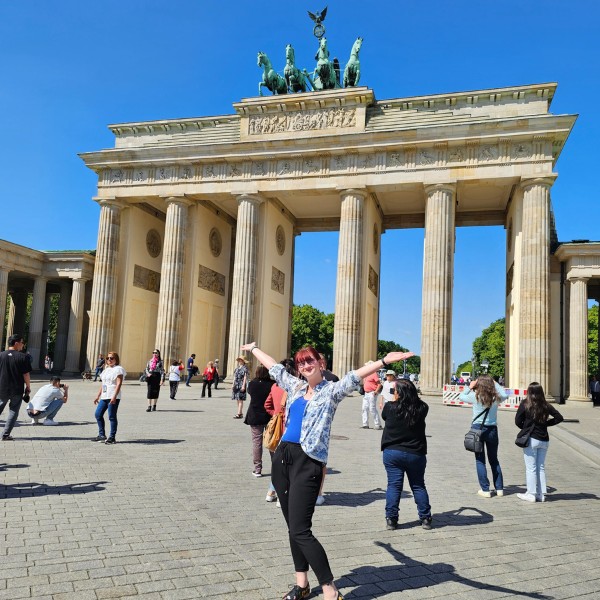 I mean, how could you miss it?
I mean, how could you miss it?As an American tourist or any tourist, it would show great love and respect to the German people to see others from around the world visiting such an important landmark of their history.
A Few Quick Tips:
- Be punctual! Being on time for dinner and reservations, or when invited to someone's home, always be on time, even a little bit early! Being late is a big no-no. Early is the best time.
- Making eye contact when shaking someone's hand or while having a conversation is a great display of respect.
- Driving on the autobahn can be scary because many times there isn't a strict speed limit. Keep to the middle or right lane if you aren't comfortable driving at the high speeds that take place in the left lane.
- Wishing folks a happy holiday, whichever holiday it may be, before the actual day, is considered bad luck!
- Then, of course, some things are considered more common sense. For example, one simply does not talk about Germany's turbulent history, including the details of World War II. In places such as history museums or when visiting monuments and memorials, it is socially acceptable to bring these things up. But only in a respectful and non-offensive way.
Now you're all set for some German vacations! Of course, like every country, there are many more rules and customs, but these are some of the basic things to avoid in Germany to help one better understand and maybe drop some German stereotypes.
Alrighty, travelers.
“Today is your day! Your mountain is waiting … So get on your way!” ~ Dr. Suess
























